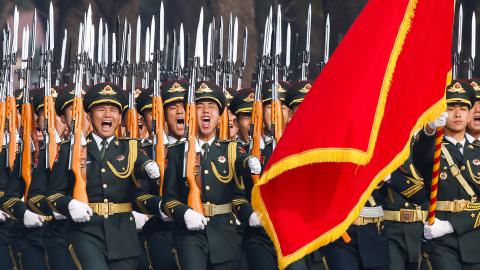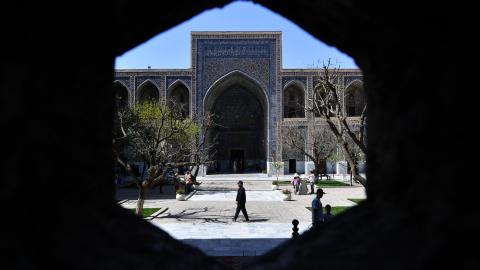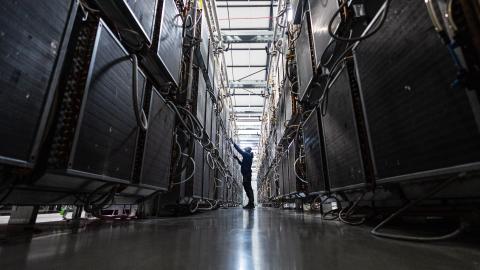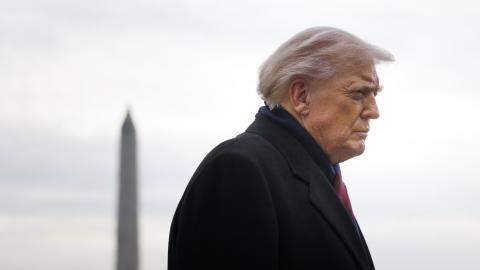Chinese Premier Wen Jiabao's April 11-13 visit to Japan helped advance the modest détente that has marked Sino-Japanese relations since Shinzo Abe became Japanese Prime Minister in September 2006. Abe has made improving ties between China and Japan—which had deteriorated sharply—a priority. Despite some achievements, however, the summit failed to resolve the underlying economic and especially security tensions between the two countries.
Wen's sojourn represented the first visit by a senior Chinese leader to Japan in seven years. He described his trip as an effort to "melt the ice" that had characterized Sino-Japanese relations in recent years under Abe's predecessor, Junichiro Koizumi. Until Abe's October 2006 visit to Beijing, the Chinese government had frozen high-level summits with Japanese leaders outside the context of multilateral gatherings in order to protest Koizumi's annual visits to the Yasukuni Shrine. In his speech to the Japanese parliament, Wen intimated that Abe should continue to refrain from visiting the shrine, which the Chinese view as a symbol of Japanese militarism, to avoid giving the impression that Japanese apologies for wartime atrocities were insincere.
Despite the high-profile cultural and business exchanges that characterized the visit, Wen's warning underscored the underlying tensions that still trouble the relationship between the two governments. For example, Wen and Abe failed to achieve discernible progress on the Sino-Japanese dispute over the energy resources under the East China Sea dispute. Even as Wen visited Tokyo, Japanese officials expressed concern about a report that China's state-controlled CNOOC Ltd. had begun processing oil and natural gas from the Chunxiao/Shirakaba gas fields that are currently disputed by the two countries. At the summit, the two governments agreed only to continue bilateral discussions and to review a report on how their countries could jointly develop the undersea natural resources. Their present energy cooperation focuses mostly on joint conservation and environmental measures.
In addition to conflicting territorial and resource claims, many Japanese have become increasingly concerned about China's military intentions and capabilities. The Japanese defense community has identified China's military modernization as potentially threatening and called on Beijing to make its defense programs more transparent. In December 2005, both Foreign Minister Taro Aso and Seiji Maehara, leader of the opposition Democratic Party of Japan, described China as a military threat to Japan.
More recently, the Chinese government's March 2007 announcement that it plans to increase its official defense budget, which foreign experts consider vastly understates the actual level of expenditures, to record levels has further deepened Japanese unease about Beijing's military buildup. At the time of Wen's visit, Japanese Defense Minster Fumio Kyuma acknowledged that China's expanding naval and air force capabilities also represent an issue of concern. Despite Beijing's protests, Abe continues to discourage European governments from ending their ban on arms sales to China.
Japanese leaders, like those of the United States and other Asian countries, have also long expressed concerns about a perceived lack of transparency regarding China's military programs. Beijing's January 2007 test of an anti-satellite weapon generated renewed Japanese complaints in this area. At the recent summit, the two countries agreed to create a "hot line" between their defense establishments. They also advanced plans to expand military exchanges, including reciprocal naval ship visits.
The communications link might help prevent the inadvertent escalation of future military incidents, such as when the Japanese detect another Chinese submarine in their territorial waters. Neither the hot line nor the exchanges, however, will directly address the more general apprehension in Japan regarding China's long-term military plans.
For their part, Chinese leaders disapprove of Japan's growing military capabilities, efforts to revise the country's pacifist constitution, and Tokyo's expanding security role in East Asia. In particular, they fear Japan's developing military cooperation with the United States could lead to Tokyo providing de facto support for U.S. defensive operations in support of Taiwan in a future cross-straits confrontation.
To Beijing's annoyance, the Japanese and American foreign and defense ministers participating in the February 2005 Security Consultative Committee (SCC) session publicly identified for the first time the "peaceful resolution of issues concerning the Taiwan Strait" as a "common strategic objective" in the Asia Pacific region. Chinese strategists especially worry that Japan and the United States could share missile defense technologies with Taiwan, negating Beijing's strategy of deterring the island's independence aspirations by threatening missile strikes in response to Taipei's assertions of greater autonomy.
Over the long term, Chinese strategists fear that Japan could exploit its technological and industrial potential, including the country's latent nuclear weapons capacity, to become a major military power. One reason behind Chinese government pressure on North Korea to curb its nuclear weapons program is that Pyongyang's militant policies have increased Japanese interest in developing an independent nuclear deterrent. The October 2006 North Korean nuclear test led Japanese officials to conduct an unprecedented public debate about possibly acquiring nuclear weapons. In response, He Yafei, the Chinese assistant foreign minister, warned: "If any country or any party tends to take advantage of the current nuclear issue on the Korean Peninsula to get involved or engaged in the research and development of nuclear weapons, then that is wrong."
Underlying their differences over history, natural resource claims, and military activities is the fundamental problem that East Asia has never experienced a situation in which both Japan and China were powerful and assertive states. Before Japan's 1868 Meiji Restoration, China was the dominant regional power. For the next century, Tokyo enjoyed a superior position, interrupted only for a short period after World War II. As a result of Japan's decade-long economic stagnation and China's remarkably successful economic transformation, East Asia now must make room for two roughly equivalent economic powers, both with expanding security concerns and military capabilities.
Wen's refusal to heed Abe's suggestion that the Chinese government make a "bold decision" and support Japan's campaign to become a permanent member of the U.N. Security Council demonstrates that Chinese leaders will continue to contest Japan's aspirations for greater global influence. At present, China is the only Asian country enjoying such status, and evidently Beijing desires to maintain its privileged regional position.



















